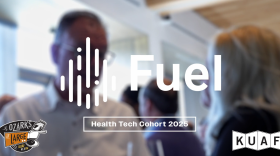Drug advocacy groups and the DEA are warning the public and Arkansans about a dangerous trend in the illegal drug supply: Xylazine, also known as Tranq, a powerful sedative used in veterinary tranquilizers. Xylazine is now being mixed into other substances like fentanyl, where just 2 milligrams of fentanyl, equal to 10 to 15 grains of table salt, is considered a lethal dose. This dangerous trend has now found its way into states, communities, and cut into other narcotics.
In comparison, Xylazine has been found to be anywhere from 2 to 40 times stronger than fentanyl, and because Xylazine is not an opioid, an opioid-reversal drug like Narcan does not impact its effect. Despite this, experts still advise people to distribute Narcan if drug poisoning is suspected, in case it is mixed with other opioids.
Brittany Kelly and Chris Jones are with Northwest Arkansas Harm Reduction, and they say Xylazine is coming into the area a lot quicker than expected.
“It is an animal tranquilizer that's being cut with fentanyl, and people who are using fentanyl or are using it because it's all they have. We've taken away heroin to a point that it's not available for people who are in addiction. So people have sought this drug out and now it’s being cut with Xylazine. Xylazine is causing things like necrosis, so it's killing the cells at the injection site and it's not allowing them to heal,” Kelly said.
The most dangerous part about Tranq - it can cause difficulty breathing, dangerously low blood pressure, a slowed heart rate, and open wounds that can become infected according to Centers for Disease Control and Prevention, the CDC.
Users aren't just facing the risk of overdose. Those injecting mixtures containing Xylazine can suffer severe tissue damage, also possibly leading to amputation.
Over 107,000 Americans have died from drug poisonings in 2021, according to the CDC, with the DEA laboratory saying synthetic opioids like fentanyl account for over 66% of those deaths. Last year, there were 415 fatal drug overdoses in the state according to the Arkansas Department of Health. Fentanyl is the leading contributor in most of those deaths.
“I've been able to speak with a handful of people that described a hospital visit while they were using, not knowing that it could have been Xylazine. But it kind of lines up with the sores, the progressive, in the emergency room getting wound care, but it progressively getting worse, which is one of those things with necrosis.
Then also a few people that have come into detox, and they said that they used ‘six doses of Narcan and were unable to revive me until we got to the hospital’, which is also one of those things that we would see with Xylazine.
I think that it's probably more prevalent than we know about, and people just don't know that that's what they're getting. Again, that's the importance of being able to test our substances,” Jones said.
As of now, Xylazine test strips are still considered felony paraphernalia. Which according to NWA Harm Reduction puts volunteers at risk.
“It's definitely tricky. As far as the volunteers, you know, we don't make them carry or distribute anything they're not comfortable with. We do work with a lot of the local law enforcement and talk about this thing regularly. So they're less likely to prosecute for this kind of thing. I'm not saying it won’t happen but less likely,” Kelly said.
Jones says legislating the drug epidemic is hard when new substances are constantly on the horizon.
“Reading the new Fentanyl Accountability Act. It's specific to fentanyl test strips. So I feel like it's probably a gray area, [but] think it's something that can be addressed. I've only talked with a few people, at the state level, they said it's a little bit easier to do an amendment to an act as opposed to writing a whole new one. That's something that we'll need to be tackling,” Jones said.
Kelly and Jones both work to destigmatize the work they do: they educate, provide sterile items, and connect people to resources.
“We want to reduce the risk of any risky behaviors, any harmful behaviors. So we distribute safe use items. Safe consumption items for substance use, whether that be through syringes, clean pipes, mouthpieces, but then also sex workers or people that have any risky behaviors and then education. I think that's the biggest key with most of the people that we work with educating them on some of the things that they may be using that they don't realize what could be happening. Then also resources for recovery, if that's what they're wanting to do,” Jones said.
Building community relationships is by far one of the most important things NWA Harm Reduction does, it saves lives and helps improve them too.
“I think there are some people, they may contract something while they're using, and then feel like they're not worth not using. Whether it's worth like the endocarditis and the complications of that, whether it's hepatitis, or something like that. Then when they do want that change, and they are thinking about recovery, some people may feel like they're not worthy of it, because they're already broken. So if we can reduce any of those factors, any of those barriers to recovery, then it gives people a fighting chance.”
Often, Chris says by repeatedly showing up for people, after a few visits people will ask for resources, or family members and loved ones reach out for them. The purpose of their work remains the same: keep people alive.
“I don't want anybody to feel like we're pushy. The goal is that people don't die. It's great if people are asking about resources for recovery, but the goal is that people are dying,” Jones said.
Brittany and Chris say that they have a tally of the lives that they’ve saved so far - but the real number is likely much bigger since they only receive numbers from people who self-report. Accurate reporting of the crisis and its impact is vital to finding solutions, and understanding how many people are being affected.
“We don’t know everyone that our kits have reversed, those are just people who have been comfortable enough with us to come back to us to let us know. We don’t have a follow up reporting system with the people we deliver to. Half of the people we may not be able to reach again,” Kelly said.
“I think the numbers, not just for us but for anyone in this field, are kinda skewed. Because we are not getting all of the information back, there's not a good data collecting [system] and I’ve brought it up,” Jones said.
Brittany says the impact the overdose crisis has had on her family is significant, and it’s critical to have an accurate snapshot of the epidemic.
“When my brother passed in 2017, to a heroin overdose, he was classified as cardiac arrest. The scene was apparent that wasn't what it was, but he was classified as a cardiac arrest. There were 72,000 people that year that died of overdose. In 2022, there were 110,000, and people ask me a lot why, ‘why we think those increase in numbers are’ and I'm like, ‘I don't think there's any more overdoses necessarily that happen’ I think our reporting has gotten better. Because our reporting has gotten better, we're able to see more accurate numbers, and I don't doubt if those numbers still increase, because the importance of proper reporting is continuing. But I am proud of Arkansas, that we're one of the most reduced states for overdoses in the US,” Kelly said.
As for the future, Brittany and Chris are hopeful. A new Arkansas law requires narcan kits be available in every higher education building across the state. The NWA Harm Reduction group founders say that they feel lucky that the University of Arkansas has asked them for help. It's a game changer. Chris says education is the most important part and that it should go along with the Narcan kits and training for everyone.
“I would like to think that we're going to continue moving forward with the education side, and in schools and in high schools.
But our unsheltered population, those people that we try to forget to exist, and we just keep driving by them. That's a huge community that needs our help.
We've been able to do a lot of work in South Fayetteville, and then a few other communities throughout Northwest Arkansas. But there's a lot more work to be done in that population,” Jones said.
Even though Brittany, Chris, and volunteers are trying their best to help; there are systemic issues that are significant barriers to their work: access to healthcare, poverty, housing, and funding.
“There are people that want help, that can't afford help, the health care aspect of it. We have some state funded treatment centers that are always out of funding and always have a backlog. Whenever it comes to getting somebody into treatment that's asking for help, my competition is a drug dealer, and they're going to show up by the end of the day, and I can't get them a bed and detox by the end of the day and that sucks,” Jones said. “It's beyond my scope of what I'm going to be able to help with other than just continuing to reach out to the state, and let them know that there's more that the state could be doing to help people.”
“It is that unsheltered population that doesn't have medical coverage doesn't have the ability to get into treatment somewhere. And they may be wanting it but they don't have that as an option,"Jones said.
For substance abuse treatment and mental health referrals, contact the Substance Abuse and Mental Health Services Administration's (SAMHSA) National Helpline at 1-800-662-HELP (4357).
Ozarks at Large transcripts are created on a rush deadline by reporters. This text may not be in its final form and may be updated or revised in the future. Accuracy and availability may vary. The authoritative record of KUAF programming is the audio record.








